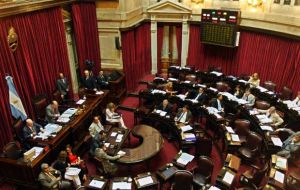MercoPress. South Atlantic News Agency
Argentina approves much disputed controversial Media Bill
 Opposition argues it’s an attempt to gag the press and favour political cronies
Opposition argues it’s an attempt to gag the press and favour political cronies Argentina passed early Saturday the controversial Media Bill, which would overhaul broadcasting regulations in the country. Forty-four Senators voted in favour of the bill, only 24 against it. The controversial broadcasting bill was passed by the Lower House two weeks ago, and the government was reportedly pressing allied lawmakers to pass it without the introduction of any changes.
Thousands celebrated in Buenos Aires outside the Congress in a massive demonstration led by pro-government picket leader Luis D' Elía. The Media Law splits airwaves' licenses into thirds, one for the government, one for private companies and a third for social organizations, which is seen as a key support to many organizations currently funded by social security plans.
The opposition had heavily resisted the bill, describing it as an attempt of the Kirchner administration to gag the press and pave the way for businessmen close to the government to get a share of the media market. They already said they would present a new law-draft to replace the law approved yesterday once the new lawmakers who were elected on June 28 take office in December.
President Cristina Fernández de Kirchner has claimed that a new law to rule broadcasting licenses was important because it would limit the clout of media monopolies. But opposition lawmakers have accused the government of trying to control the media through the drastic reform, which would force major media groups to downsize to comply with the new regulations.
Criticizing the bill, dissident Peronist Senator Sonia Escudero said Argentine businessmen “are afraid that the K holding might take over their media” and added that “this will be the Coup de grâce of freedom of expression.”
Gerardo Morales, the head of the opposition Radical Party, criticized the bill because it grants watchdog powers to the government and not to an independent body.
Morales also said he opposed the government's right to review licenses and supported the introduction of an article to ban government contractors from owning media companies.
Ruling FPV Victory Front Senator Guillermo Jenefes (Jujuy), head of the Communication and Freedom of Speech Committee, said during the debate that he acted “based on my political convictions” and asked not to be held “responsible” for the passing of the media reform bill.
Jenefes has been in the spotlight over the last days, as he was the head of a key committee in the Upper House, but is also a member of the board of directors of a multimedia group in his home province, owned by his wife. He made public that he had objections to the government proposal. However, he signed - although in “partial disagreements - the committees’ resolution that cleared the bill for debate on the floor.
”It was my duty not to hold my caucus hostage“ of his signature, he added. Jenefes also flatly rejected rumours that he had been pressured by the government to support the bill. ”Actually, I've been pressured by the media, that had the pretension that this senator betrayed his ideas and the Justicialist Party,“ he pointed out.
Echoing previous statements, Jenefes said ”this bill is not that bad as to reject it and not that good as to vote it as it stands,“ urging senators to ”dialogue and pass a law agreed upon by all parties to make it last 20 years.”
Three ruling party senators who had voted against the government's draft to increase soybean export duties in 2008: Rubén Marín (La Pampa), Teresita Quintela (La Rioja) and Elena Corregido (Chaco), backed the media bill. Likewise, senators Horacio Lores (MPN Neuquén Popular Movement), María Rosa Díaz and José Martínez (Tierra del Fuego) who voted against the export duties also sided with the government, as well as Carlos Salazar (Republican Force, Tucumán) and María Dora Sánchez (Radical, Corrientes) who first spoke against the bill and change their minds in the last 48 hours.
Socialist Senator Rubén Giustiniani also said last night he will vote in favour of the bill like his party did in the Lower House because it champions “fundamental human rights.” But Giustiniani added that he will also support changes in six articles of the bill.
In turn, Civic Coalition Senator María Eugenia Estenssoro (Federal Capital) noted that Congress “must pass a good law, not any law.”
“There are people who say that those who disagree with the bill are against the citizens. We've always been on the side of democracy and the citizens. It has been the ruling party that quashed the debate on this matter until now,” she added.
Estenssoro remarked that “the right to information is essential to democracy, because it is information that allows people to stop being just persons and become informed citizens.”
She added that Fernández de Kirchner and her husband Néstor Kirchner want to emulate the “dictatorship” and “model of media concentration” of Italian Prime Minister Silvio Berlusconi.
Dissident Peronist Senator Hilda “Chiche” Duhalde (Buenos Aires province) said during the debate that “I'know of many mayors” who attended the rally under pressure because they depend on national government funds. Duhalde said the government will now bid to control the press through state advertising, which she estimated in one billion pesos a year.
Dissident Peronist Senator Juan Carlos Romero (Salta) also accused the Kirchner government of already placing state ads in media companies owned by cronies.




Top Comments
Disclaimer & comment rulesCommenting for this story is now closed.
If you have a Facebook account, become a fan and comment on our Facebook Page!